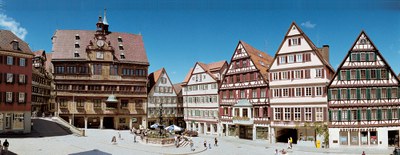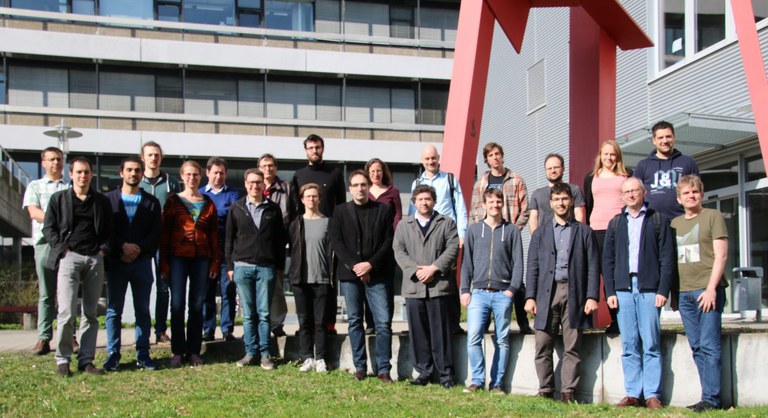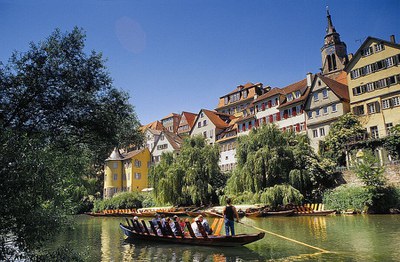Conference SPP 1786

Registration
We start the conference with a registration session on Monday, 9 am.
Topic
The conference is part of SPP 1786 Homotopy Theory and Algebraic Geometry and focuses on new connections in the areas of tropical geometry, Arakelov theory, and (non-archimedean) algebraic geometry, e.g. tropical quantum counts, motivic integration, and relations with motivic nearby cycles functors.
Dates
- March 27-31, 2017
- University of Tübingen, Germany

Location
The conference will take place in
- Campus Morgenstelle, Building C, Room N14 (entrance floor).
The campus is most conveniently reached by bus (walking 20 min. uphill). The bus stop is called "BG Unfallklinik". You can use the bus lines
- 5, 13, 18 and 19 from the train station,
- 13, 18 and 19 from bus stop "Parkhaus König" or "Rümelinstraße" (which are close to your hotel and the old town).
Accommodation
We booked rooms in Hotel Hospiz right in the middle of the old town. It is located here, which is around 10 minutes walking distance from the train station. To reach the conference venue, see the info above and the links below.
Welcome Party
We will organize a small and informal get-together on Monday evening at the math building. This is an opportunity to get to know each other while having drinks, snacks, music, maybe games. We start Monday, 19:00. More information at the conference.
Travel information
Schedule (preliminary)
| Time | Monday | Tuesday | Wednesday | Thursday | Friday | |
| 9:00 | Registration | |||||
| 9:30 – 10:30 | Itenberg | Ivorra | Mikhalkin | Ruddat | Shustin | |
| 10:30 – 11:00 | Coffee | Coffee | Coffee | Coffee | Coffee | |
| 11:00 – 12:00 | Rabinoff | Göttsche | Künnemann | Gathmann | Shaw | |
| 12:00 – 14:00 | Lunch break | Lunch break | Lunch break | Lunch break | Lunch break | |
| 14:00 – 15:00 | Sebag | Schroeter | Afternoon activity | Overholser | ||
| 15:00 – 15:30 | Coffee | Coffee | Coffee | |||
| 15:30 – 16:30 | Maclagan | Fantini | Blechman | |||
| 19:00 | Welcome Party |
Abstracts
Itenberg, Real algebraic curves with finitely many real points
The talk is devoted to real plane algebraic curves with finitely many real points. We study the following question: what is the maximal possible number of real points of such a curve provided that it has given (even) degree and given geometric genus? We obtain a complete answer in the case where the degree is sufficiently large with respect to the genus, and prove certain lower and upper bounds for the number in question in the general case. This is a joint work with E. Brugallé, A. Degtyarev and F. Mangolte.
Joe Rabinoff, The Tropical Skeleton
Let X be a subvariety of a toric variety. There is a canonical section of the tropicalization map on the multiplicity-one locus of Trop(X), which is continuous on torus strata. However, it may fail to be continuous under degenerations to the boundary. We introduce a subset of X^an that we call the tropical skeleton, in order to study this phenomenon. We give conditions under which the section is continuous. When X is schön, we show that the tropical skeleton is canonically isomorphic to the Helm--Katz parameterizing complex. This work is joint with Walter Gubler and Annette Werner.
Sebag, Motivic nearby cycles I: on a question of Denef-Loeser
see below
Maclagan, The tropical Nullstellensatz
Tropical versions of the Nullstellensatz have been introduced since the start of tropical geometry. In this talk I will introduce a new version, joint with Felipe Rincon, that uses the theory of valuated matroids to get a statement more directly analogous to the classical Nullstellensatz.
Ivorra, Motivic nearby cycles II: relation with Hodge theory and non-Archimedean geometry
We will explain part of our common works dealing with motivic integration, nearby cycles, non-Archimedean geometry and motives. In the first lecture Julien Sebag will explain the origin of the problem of understanding motivically the zeta function of Denef-Loeser and will explain a first comparison theorem in this direction. In the second lecture, Florian Ivorra will explain more recent results linking motivic nearby sheaves with non-Archmidean geometry and weights in Hodge theory. These results are closely related to works of Berkovich and Ayoub-Zucker. (Partly obtained in collaboration with Joseph Ayoub).
Göttsche, Tropical refined curve counting
This is report on joint works with Shende, Block, Schroeter, Kikwai. We introduce and refined enumerative invariants of toric surfaces in tropical geometry: Refined Severi degrees, polynomials in a variable y interpolate between the Severi degrees counting complex curves at y=1 and the totally real Welschinger numbers at y=-1. We will study their generating functions. We also study refined Broccoli invariants which interpolate between descendent invariants and non-totally real Welschinger invariants.
Schroeter, An interpretation of the refined multiplicity of a tropical curve
Focusing on the general strategy I will present joint work with Johannes Nicaise and Sam Payne where we interpret the refined multiplicity of some tropical curves as the chi_y genus of a semialgebraic domain over the field of Puiseux series using the theory of motivic integration.
Fantini, Self-similarity of weighted graphs and non-archimedean links of surface singularities
I will discuss joint work with Charles Favre and Matteo Ruggiero, giving a characterization of those normal surface singularities that satisfy a self-similarity property. The main character in this talk will be a non-archimedean version of the link of a singularity, an object that I will describe using tools from Berkovich geometry.
Mikhalkin, 1-forms on tropical curves
There are two distinct ways to construct tropical limits of 1-forms on complex algebraic varieties, in particular complex curves. An older, more well-studied construction (described in the 2006 joint paper of Ilia Zharkov and myself) descends to an R-valued differential 1-form on tropical variety viewed as a stratified smooth manifold. This construction fits well with tropical Jacobians and tropical cohomologies, but perhaps is not tropically intrinsic. In my talk I'll focus on the second, more tropically intrinsic construction, as well as its connections to the first constructions and its applications (in particular, for realizability questions). The talk is based on a joint paper (in progress) with Nikita Kalinin as well as the relevant chapters in the joint book (in progress) with Johannes Rau.
Künnemann, Positivity properties of metrics in non-archimedean geometry
We discuss positivity properties of metrics on line bundles over non-archimedean analytic spaces and applications to the solution of the non-archimedean Calabi-Yau problem in the equicharacteristic zero case.
Ruddat, Descendant log Gromov-Witten invariants for toric varieties and tropical curves
I am reporting on recent work with Travis Mandel where we prove the curve by curve correspondence of tropical curves and stable log maps with general incidence and psi-class conditions in toric varieties for genus zero curves and all non-superabundant higher-genus situations.
Gathmann, Moduli cycles for plane tropical curves of any genus
It is well-known that the number of plane tropical curves of fixed degree and genus through general given points does not depend on the choice of point configuration, either by using the Correspondence Theorem or by a direct combinatorial analysis of the curves when moving the points. In this talk, we will give another approach to this statement: We construct the moduli spaces of plane curves as cone complexes with a (virtual) fundamental cycle, so that the independence follows from the general intersection theory of cone complexes.
Overholser, Tropical Descendants
Recent work has revealed a close relationship between logarithmic and tropical Gromov-Witten theory. In contrast, the connection between ordinary descendant Gromov-Witten invariants and tropical curve counts remains rather mysterious. I will explain the history of this connection and joint work with Mandel & Ruddat that aims to clarify it.
Blechman, Titel
In this talk we will first define refined tropical invariants (following Block-Goettsche and Goettsche-Schroeter) which are Laurent polynomials in one variable y, that under some some appropriate conditions, for y=1 yield Gromov Witten invariants, and for y=-1 yield Welschinger invariants of toric del Pezzo surfaces, that count complex, resp. real plane rational tropical curves passing through a generic configuration of points. Then we will define a refinement of arbitrary rational tropical descendant invariants, that count plane rational tropical curves that pass through a more generic configuration of points. Joint work with E. Shustin.
Shustin, Enumeration of unicuspidal plane curves of any genus via tropical geometry
The celebrated Mikhalkin's correspondence theorem allows one to enumerate plane curves of any genus with only nodes as singularities. We present a correspondence theorem for curves with nodes and one cusp. It appears to be much more involved than the Mikhalkin's theorem. Enumeration of unicuspidal curves has been addressed before by Zinger, but only in the rational case, and by Kazarian, Liu, Rimanyi for small degrees or for the total Milnor number less than twice the degree. Time permitting we will discuss a tropical approach to enumeration of curves with more complicated singularities. Joint work with Y. Ganor.
Shaw, Chern-Schwartz-MacPherson classes of matroids
Chern-Schwarz-Macpherson (CSM) classes are one way to extend the notion of Chern classes to singular and non-complete varieties. Matroids are an abstraction of the notion of independence in mathematics. In this talk, I will provide a combinatorial analogue of CSM classes for matroids, motivated by the geometry of hyperplane arrangements. In this setting, CSM classes are polyhedral fans which are Minkowski weights. One goal for defining these classes is to express matroid invariants (the characteristic polynomial, h-vector, and Speyer's g-polynomial) as invariants from algebraic geometry. Moreover, these combinatorial CSM classes can be used to study the complexity of more general objects such as subdivisions of matroid polytopes and tropical manifolds. This is based on joint work with Lucia Lopez de Medrano and Felipe Rincon and also work in progress with Alex Fink and David Speyer.
Participants
- Lev Blechman
- Boulos El-Hilany
- Lorenzo Fantini
- Giuliano Gagliardi
- Andreas Gathmann
- Lothar Göttsche
- Christoph Goldner
- Andreas Gross
- Marvin Hahn
- Ilia Itenberg
- Florian Ivorra
- Philipp Jell
- Klaus Künnemann
- Diane Maclagan
- Hannah Markwig
- Thomas Markwig
- Grigory Mikhalkin
- Joe Rabinoff
- Johannes Rau
- Arthur Renaudineau
- Helge Ruddat
- Julien Sebag
- Kristin Shaw
- Eugenii Shustin
- Alejandro Soto
- Veronika Wanner

